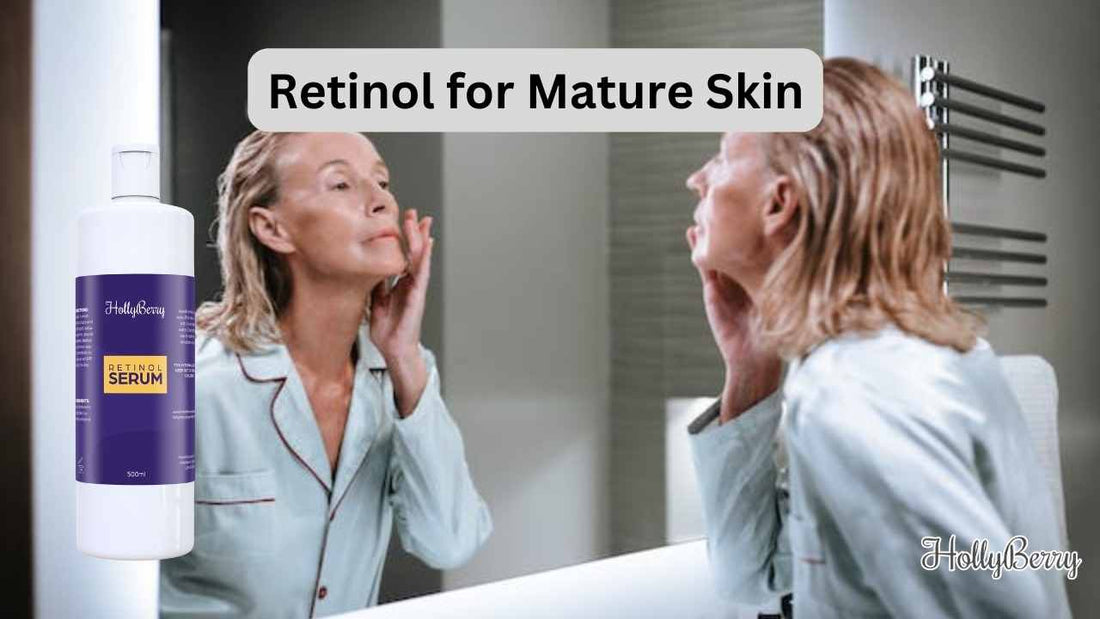
Retinol for Mature Skin
Share
Effective Anti-Ageing Solutions Explained

Retinol refines the skin's surface by accelerating its natural exfoliation process, resulting in a smoother, more even-toned complexion.
This potent ingredient has been found in a variety of skincare products, including serums and creams, catering to different skin types and needs. Known for its remarkable benefits, retinol has become an essential component of an effective skincare routine for individuals with mature skin.
However, it is crucial to approach the use of retinol with caution and learn the appropriate ways to incorporate it into one's regimen, as improper usage may result in undesired side effects.
Consulting with a skincare expert and gradually introducing retinol into the routine can help achieve optimal results while minimising potential risks.
Benefits of Retinol for Mature Skin
Stimulates Collagen Production
Retinol, a form of vitamin A, is widely known for its role in stimulating collagen production. Collagen is a crucial protein that maintains skin elasticity and prevents sagging.
As we age, collagen production naturally decreases, leading to the formation of wrinkles and fine lines. Retinol fights this issue by boosting collagen synthesis, contributing to firmer and smoother skin.

Order our serum here
Reduces Appearance of Fine Lines and Wrinkles
Another major advantage of retinol for mature skin is its ability to reduce the appearance of fine lines and wrinkles.
By increasing skin cell turnover and promoting collagen production, retinol restores the skin's youthful appearance. Regular use of retinol-infused products like cleansers, serums, and creams can contribute to a visible reduction in wrinkles and fine lines.
Improves Skin Texture and Tone
Retinol is highly effective in improving the texture and tone of the skin. It increases cell proliferation and exfoliates the skin, removing dead skin cells and encouraging the growth of new, healthy ones.
This results in a more even skin tone and a refined texture, making the skin appear smoother and more radiant.
Fades Pigmentation and Dark Spots
As a potent antioxidant, retinol not only addresses common signs of ageing but also targets pigmentation and dark spots.
It works by inhibiting the production of melanin, the pigment responsible for skin colour, and promoting the sloughing away of pigmented cells. Retinol's ability to effectively fade pigmentation and dark spots is another reason it has become a popular ingredient in anti-ageing skincare products.
In conclusion, retinol offers numerous benefits for mature skin, ranging from stimulating collagen production and reducing the appearance of wrinkles to improving skin texture and fading pigmentation.
Including retinol-infused products in a daily skincare routine can contribute to more youthful-looking skin and combat common signs of ageing.
Choosing the Right Retinol Product and Usage
Identifying Appropriate Concentration
It is crucial to choose the right retinol concentration for your skin type and needs. For those new to retinol, it's best to start with a lower concentration, such as 0.01%, to minimise potential irritation and gradually increase usage over time.
More experienced users may opt for higher concentrations. It's advisable to consult a dermatologist for guidance on the ideal strength for your specific skin concerns.
Understanding Different Retinoids
Retinoids are a family of compounds derived from vitamin A. They are available in various formulations, such as prescription-strength tretinoin and over-the-counter options like retinol and retinyl palmitate.
Granactive retinoid, a newer form, is known for its gentler properties and lower risk of irritation. Familiarise yourself with these different retinoids to determine which one best suits your needs.
Application Techniques for Sensitive Skin
If you have sensitive skin, it's crucial to apply retinol products carefully to minimise irritation. A gentle retinol serum or retinol night cream could be suitable options. To ease your skin into retinol use, start by applying the product sparingly every third day.
Gradually increase the frequency as your skin builds tolerance. Mixing the retinol treatment with a moisturiser can also help dilute the product and provide additional hydration.
Incorporating into a Skincare Routine
Integrating retinol into your daily skincare routine is essential for seamless use and maximum benefits.
Apply the retinol product in the evening, as sunlight can degrade its effectiveness. After cleansing and before moisturising, apply a pea-sized amount to your face and neck. Retinol can be drying, so pair it with a hydrating moisturiser or serum to counteract any potential dryness.
- Cleanse
- Retinol product
- Moisturise
Sun Protection and Retinol
Retinol can make your skin more susceptible to sun damage. It is vital to wear a broad-spectrum sunscreen with an SPF of at least 30 during the day, even when using retinol only at night.
This practice will protect your skin from harmful UVA and UVB rays and ensure that the retinol product delivers optimal results without causing unwanted side effects.
In summary, choosing the right retinol product for mature skin involves considering concentration, understanding different retinoids, mastering application techniques, incorporating retinol into your skincare routine, and implementing proper sun protection.
By following these guidelines, you can confidently use retinol products to achieve softer, younger-looking skin.
